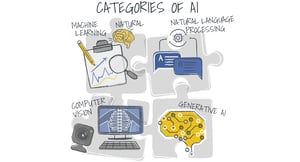End-to-end IT solutions for healthcare organizations.

AI in Healthcare: Opportunities & Benefits
When it comes to AI as it relates to healthcare, there are four prominent areas that hold immense potential:
- Machine Learning and Predictive Analytics (ML/Predictive)
- Computer Vision
- Natural Language Processing (NLP)
- Generative AI
These areas could not only help improve workflows, but they could also help enhance the patient experience. Here’s more on what these topics mean, and how they could change the healthcare landscape.
Machine Learning and Predictive Analytics (ML/Predictive)
These AI features enable healthcare organizations to harness the power of data to predict patient outcomes, optimize resource allocation, and enhance clinical decision-making.
For example, machine learning could facilitate improved scheduling options for patients, or perhaps allow for algorithmic management of patient data systems.
Predictive analytics could help minimize errors, and spot things like insurance claims that might get rejected, and more.
Natural Language Processing (NLP)
NLP relates to understanding, interpreting, and generating human language, and enables computers to comprehend and process text and speech. It can be used to extract valuable insights from clinical notes and patient records, for example, creating more efficient workflows for providers.
Computer Vision
This area extends AI's reach into image analysis and interpretation, offering applications such as radiology image analysis, pathology diagnostics, virtual nursing, and fall-risk reduction. Computer vision can help expand offerings for patients, potentially allowing for better outcomes.
Generative AI
While it’s all the buzz when it comes to content, generative AI opens doors to creative problem-solving. For example, it can assist clinicians with medical summaries and creating conversational tools for patient communications by leveraging large language models specifically trained for healthcare use cases.
_________________________________________________________________
Our team of experts created this FREE HIPAA compliance checklist so you can know where your organization stands.
_________________________________________________________________
AI Ingredients for Healthcare
![]()
Achieving success with any of these technologies requires a thoughtful approach, because in the intricate world of healthcare—where precision and performance can mean the difference between life and death—the adoption of AI is akin to crafting the perfect culinary masterpiece.
Electronic health records (EHR), genomics data, insights from social and community-based sources, claims data, operational, and financial data provide the essential raw materials.
It’s important to note that data alone is insufficient. It's the equivalent of a chef having the finest ingredients but lacking culinary expertise. Instead, in order to harness AI’s full potential, you need a skilled team of analytics and data scientists to help create your perfect systems.
Further, in this ‘recipe for success,’ it’s also important to have an executive team willing to invest in the future despite today’s economic headwinds. Perhaps that’s the key, secret ingredient. Much like a restaurant owner who continually upgrades their kitchen equipment, healthcare leaders must be forward-thinking and committed to funding AI initiatives, recognizing that the long-term benefits far outweigh the initial costs.
With data, a team of analytics experts, and a forward-thinking executive office, AI becomes a valuable ally—enabling healthcare providers to practice at the top of their license. They can improve patient care and ultimately transform healthcare as we know it.
~~~
About the Authors:
Eric Thrailkill: With four decades of healthcare experience, education in accounting, a CPA, and at one time, the CIO of three separate national provider organizations: multi-specialty medical clinics, correctional health services, and ambulatory surgery centers. Now, Thrailkill spends time leading Project Healthcare, a program of the Nashville Entrepreneur Center.
Adam Silverman, M.D.: In his thirty-year career as an Internist, Silverman has transformed from a practitioner into a pragmatic entrepreneur who realizes that healthcare innovation needs to happen.
Lauren Hatcher: Currently an M.D./M.B.A. student graduating in May of 2024.
_________________________________________________________________
Don't forget to get your FREE HIPAA compliance checklist!
_________________________________________________________________


